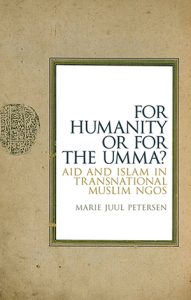For Humanity or for the Umma?: Aid and Islam in Transnational Muslim NGOs

Author: Marie Juul Petersen
Publisher: Hurst Publisher
Year of Publication: 2016
Print Length: 272 pages
Genre: Non-Fiction / Social Science, Sociology
Area: The United Kingdom (UK), Kuwait, Saudi Arabia, Lebanon, Jordan, Bangladesh
Topic: Humanity, Islam, Muslim World, Non-Profit Organization (NGO), Transnationalism, Organization, Charity, Humanitarian Action & Humanitarianism, Development, Domestic & Public, Giving, Islamophobia, Philanthropy, Politics & Power, Social/Aid Workers, War on Terror
A discussion of how Muslim NGOs function and their global impact in disaster relief and development.
In the wake of 9/11 and the ‘War on Terror’, transnational Muslim NGOs have too often been perceived as illegitimate fronts for global militant networks such as al-Qaeda or as backers of national political parties and resistance groups in Palestine, Afghanistan and elsewhere. Yet clearly there is more to transnational Muslim NGOs. Most are legitimate providers of aid to the world’s poor, although their assistance may sometimes differ substantially from that of secular NGOs in the West.
Seeking to broaden our understanding of these organisations, Marie Juul Petersen explores how Muslim NGOs conceptualise their provision of aid and the role Islam plays in this. Her book not only offers insights into a new kind of NGO in the global field of aid provision; it also contributes more broadly to understanding ‘public Islam’ as something more and other than political Islam.
The book is based on empirical case studies of four of the biggest transnational Muslim NGOs, and draws on extensive research in Britain, Kuwait, Saudi Arabia, Lebanon, Jordan and Bangladesh, and more than 100 interviews with those involved in such organisations.
‘For Humanity or for the Umma? is a path-breaking study of Muslim NGOs. Avoiding the hype and following the theory and the evidence, Petersen produces a richly textured and nuanced appreciation of how these religious NGOs navigate the worlds in which they are embedded. At once careful and creative, hers is a study that not only shines a light on the complexity of Muslim NGOs, but also points a way toward understanding religious NGOs in an age of emergency and the relief-development nexus.’ — Michael Barnett, University Professor of International Affairs and Political Science, George Washington University
Table of Contents
Acknowledgements
1. Introduction: Studying Transnational Muslim NGOs
Transnational Muslim NGOs: Faith-based Organisations or fronts for terrorism? / Actors and meanings / Processes of Islamisation / Ideologies of aid / Aid cultures / Sacralised and secularised aid / Structure of the book
2. The Cultures of Development and Islamic Aid
A common humanity: A brief history of development aid / solidarity with the umma: A brief history of Islamic aid / Dichotomies of aid? Comparing the cultures of development and Islamic aid
3. Trajectories of Transnational Muslim NGOs
Competition: Transnational Muslim NGOs in the Horn of Africa / Conflicts: Transnational Muslim NGOs in Afghanistan / Co-existence: Transnational Muslim NGOs in Bosnia / A new situation: 9/11 and the ‘War on Terror’ / Navigating between cultures
4. Piety and Professionalism: Claims to Authority in IIROSA and IICO
Designations and financial decline. IICO and IIROSA after 9/11 / Islamic dignitaries and pious Muslims / Islamic authority: ‘Because of believing in God…’ / Professional authority: ‘Our activities are transparent’ / Running a health clinic or working in an Islamic organisation?
5. ‘It’s all in Islam!’ Aid Ideologies in IIROSA and IICO
Visions of aid / Rationale of aid: A religious duty and a moral responsibility / Strategies of aid: Relief, da’wa, education, and empowerment / A sacralised aid?
6. Professionalism and (a bit of) Piety: Claims to Authority in Islamic Relief and Muslim Aid
Fame and new funding opportunities: Islamic Relief and Muslim Aid after 9/11 / Islamic personalities and young professionals / Professional authority: ‘Working towards international standards’ / Islamic authority: ‘The humanitarian spirit of Islam’ / ‘In faith-based organisations, you will never get 100 per cent professionalism’
7. ‘What’s so Islamic about Us?’: Ideologies of Aid in Islamic Relief and Muslim Aid
Visions of aid / The rationale of aid / Strategies of aid / A securalised aid?
8. Conclusion
Studying transnational Muslim NGOs / Cultures of aid: Development and Islamic Aid / Trajectories of transnational Muslim NGOs / Sacralised or secularised aid? / Developmentalising Islamic aid and Islamising development aid / The emergence of new aid cultures?
Appendix A: Methodology
Collection of data / The challenges of multi-sited fieldwork / Questions of positioning: Studying the familiar and the foreign / Accessing transnational Muslim NGOs
Appendix B: Organisational material
B1. Organisational Material, IIROSA / B2. Organisational Material, IICO / B3. Organisational Material, Islamic Relief / B4. Organisational Material, Muslim Aid
Appendix C: Field Trips, Interviews and Project Visits
C1. Field Trips / C2. Interviews / C3. Project Visits
Notes
Bibliography
Index

Marie Juul Petersen is a researcher at the Danish Institute for Human Rights, with a PhD in sociology of religion from the University of Copenhagen. Petersen’s research is centered on the relationship between human rights, development and religion; freedom of religion or belief; and faith-based organizations. She has published extensively on these topics, including For Humanity or for the Umma? Aid and Islam in Transnational Muslim NGOs (Hurst, 2016), The International Promotion of Freedom of Religion or Belief: Sketching the Contours of a Common Framework (Danish institute for Human Rights, 2019, co-authored with Katherine Marshall) and The Organization of Islamic Cooperation and Human Rights (University of Pennsylvania Press, 2019, co-edited with Turan Kayaoglu). Her work has appeared in several scientific journals, including Development in Practice, International Journal of Middle East Studies, Third World Quarterly and Voluntas: International Journal of Voluntary and Non-Profit Organizations.
Source: https://www.hurstpublishers.com/book/for-humanity-or-for-the-umma/ & https://www.g20interfaith.org/_marie-juul-petersen/
More from Marie Juul Petersen in this library, click here.
